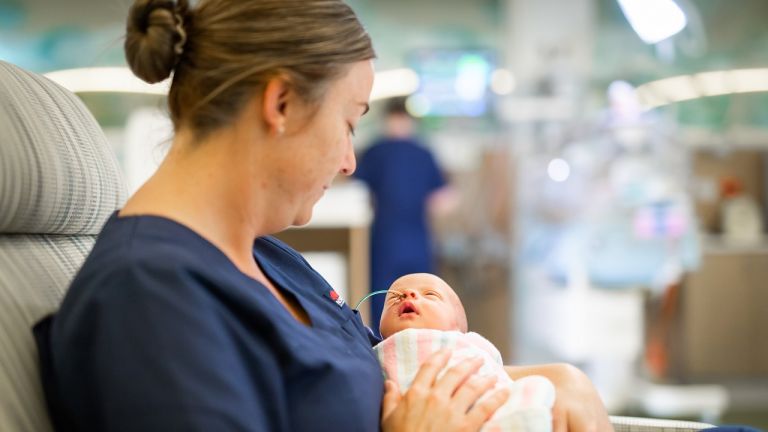About the project
The Sustainability Action Group at John Hunter Hospital Neonatal Intensive Care Unit (NICU) is reducing their environmental impact to support Hunter New England Local Health District’s goal of being carbon and waste neutral by 2030.
John Hunter Hospital NICU recycles single-use baby bottles, uses sustainable disposable nappies, and repurposes old equipment. These initiatives can be adopted by other maternity and paediatric services across NSW Health.
Project details
Recycling single-use baby bottles
The John Hunter Hospital NICU used to send around 100,000 single-use baby bottles to landfill each year. These bottles are made from polypropylene, a highly recyclable polymer with a valuable end market in Australia.
John Hunter Hospital partnered with Plasmar, who can reprocess the polypropylene baby bottles into fence posts and sleepers. The NICU Sustainability Action Group established a meticulous process for collecting and preparing the bottles. Staff are engaged and motivated by the program's success, and the process is now part of the unit's operations.
Since the baby bottle recycling program started in 2021, John Hunter Hospital NICU has diverted about 200,000 single-use plastic baby bottles from landfill, equating to 5 tonnes of plastic. The program has now expanded to the maternity and paediatric wards at John Hunter Hospital.
Procuring more sustainable disposable nappies
John Hunter Hospital NICU uses around 95,000 disposable nappies per year, contributing 20 tonnes to landfill annually – comparable to the size of 3 African elephants! Traditional disposable nappies have a high plastic content and can take up to 500 years to decompose in landfill.
Disposable nappies are convenient for new parents and busy NICUs due to their moisture-wicking properties, which protect fragile newborn skin and help maintain temperature. The John Hunter Hospital NICU Sustainability Action Group investigated alternatives with less environmental impact. They tested and reviewed eco-friendly disposable nappies based on criteria such as sizing, biodegradability, sustainably sourced materials, packaging, supply mileage, and cost. One brand met all criteria, and the team negotiated a competitive price with the supplier.
The more sustainable nappies are made from 70% biodegradable content, reducing the decomposition rate in landfill to about 45 days.
Donating NICU equipment
John Hunter Hospital NICU requires incubators, humidicribs, and overhead warmers for optimal clinical care. When equipment reaches the end of its warranty or when new technology is procured, the equipment is decommissioned. Instead of sending these items to landfill, John Hunter Hospital NICU partnered with local organisations to redistribute and repurpose the equipment. In 2023, John Hunter Hospital NICU donated:
- one Draeger Isolette Incubator to Hunter Wildlife Rescue
- two Draeger Isolette Incubators to Port Stephens Koala Hospital
- four Draeger Isolette Incubators, 13 GE Healthcare Omnibed Giraffe Incubators, and 24 Fisher and Paykel Resuscitaire Infant Warmers to MediShare.
This initiative not only helps Hunter New England Local Health District (HNELHD) meet their waste neutrality target by 2030 but also provides valuable resources to organisations in need.
